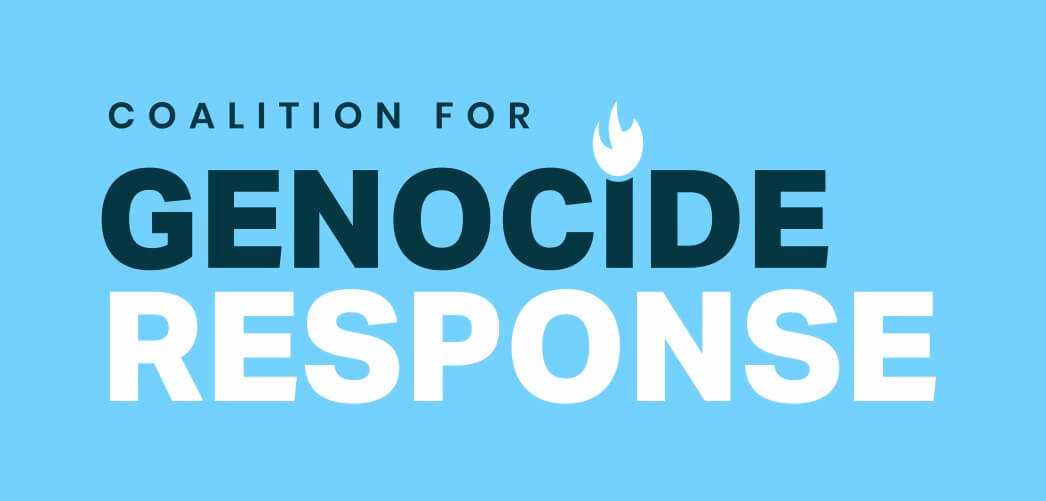
On 27 January 2021, a group of NGOs and religious leaders, led by the Coalition for Genocide Response, sent a letter to Prime Minister Boris Johnson asking him to introduce changes to the UK’s genocide responses. Among others, the letter called upon the Prime Minister to take the very first step needed to ensure a more effective response to genocide, namely, introducing mechanisms for monitoring and assessment of risk factors of genocide and determination.
The letter can be found here:
London, 27 January 2021
Dear Prime Minister,
On this occasion of Holocaust Memorial Day, we write to urge the Government to mark the day by committing to a more proactive response to genocide.
After the egregious Nazi crimes, states have been promising to never again allow such mass atrocities to be perpetrated. However, time and time again, the international community has failed to deliver on its solemn promise. This failure is, in large part, because the states themselves, including the UK, are not effectively fulfilling their duties under the UN Convention on the Prevention and Punishment of the Crime of Genocide (the Genocide Convention). Again and again, we are failing to act to prevent genocide, doing little to suppress it, failing to give the full support needed to those affected and shying away from prosecuting perpetrators.
As Raphael Lemkin, the Polish lawyer who coined the word genocide after losing 49 members of his family in the Holocaust, asked: ‘Why is the killing of a million a lesser crime than the killing of an individual?’ Decades later, this is still true and, therefore, we are asking you, as Prime Minister: Why do we keep responding to lesser offences with more seriousness than to such mass atrocities as genocide?
Only in the last few years, we have been witnessing several instances of mass atrocities meeting the legal definition of genocide, including those perpetrated by Daesh against the Yazidis, Christians and others; by the Myanmar military against the Rohingyas; by Boko Haram and Fulani militia against Christians in Nigeria; and, by the Chinese Community Party against the Uyghurs.
None of these cases exist in a vacuum or occur without warning. Time and time again there were warning signs meeting the internationally recognised risk factors of genocide, that were not acted upon. States, including the UK, have a responsibility to prevent genocide at the very moment a state learns or should have learned of the serious risk of genocide. In all of the cases listed above, no state can realistically claim that they do, or did, not know about the serious risk of genocide.
As the UK and other states continue to look the other way, the only conclusion that can be drawn is that they are worried more about diplomatic and economic interests than protecting the world’s most vulnerable communities from annihilation. Actions speak louder than words. The lack of action means that those conducting the crime still believe they can act with impunity. Impunity begets further crime. If we do not stand up now, this will be the legacy that we leave for future generations who will only see more and more such atrocities.
We were profoundly concerned that the government chose not to support the Alton Amendment (the Genocide Amendment) to the Trade Bill as it sends a wrong message to states involved in such atrocities. The Genocide Amendment is an important first step towards the UK taking back control over its genocide response strategies. The UK, as a party to the Genocide Convention, is the duty bearer, not the UN or other international bodies. We urge the Government to reconsider its position for the refined Genocide Amendment, and instead choose to signal that now is the time the UK will stand up for those facing annihilation.
On this Holocaust Memorial Day, as we pay tribute to millions who perished, we must recognise that the only way we can truly honour them is by doing better, rather than by simply echoing an increasingly empty promise of never again.
We call upon you, as Prime Minister, to lead the UK Government towards a more proactive genocide response to prevent more communities being targeted for annihilation. We call upon you, as Prime Minister, to take the very first step needed to ensure more effective address to genocide, by introducing mechanisms for assessment of risk factors of genocide and determination (including as stipulated in the Genocide Amendments or the Genocide Determination Bill) to equip the UK Government to be able to make informed responses to genocide. We owe it not just to the six million who perished in the Holocaust, the 8,000 men and boys massacred at Srebrenica or 600,000 killed in Rwanda, but to the millions of humans who currently face the looming and real threat of genocidal acts. Our generation should not be one that turns away, as so many have before.
As the UK has left the EU this is the perfect time for us to redefine ourselves and affirm our moral position globally. We need your vision for genocide prevention. No empty promises. We need your leadership on the issue of genocide responses. No excuses. Informed responses to genocide start with recognising the issue, recognising the risk of genocide or of genocide being perpetrated. No empty promises. No excuses.
Yours sincerely,
Archbishop Angaelos, Coptic Orthodox Archbishop of London, Rt Revd Philip Mounstephen, Bishop of Truro, Coalition for Genocide Response, Rene Cassin, Waging Peace, The Rights Practice, Gender and Religious Freedom, Open Doors UK & Ireland, Humanists UK, CSW, End Transplant Abuse in China, Crown Christian Heritage Trust, All Faiths Network, Coptic Orthodox Church, Refcemi, Steadfast Global
The Response
The Prime Minister responded to the letter but not to the call. In a letter dated 4 March 2021, the Prime Minister commented on the situation of Uyghurs in China and the steps taken by the UK Government in response. The Prime Minister further commented upon the Genocide Amendment and the Neill’s Amendment. However, the Prime Minister failed to acknowledge and respond to the issue that changes needed to the UK’s Government’s responses to genocide are much greater than as stipulated in the Neill’s Amendment. Indeed, the UK Government does not monitor risk factors of genocide, analyse then and make determinations of a serious risk of genocide as per the International Court of Justice’s 2007 Judgment in the case of Bosnia and Herzegovina v Serbia and Montenegro.
The response can be found here:

